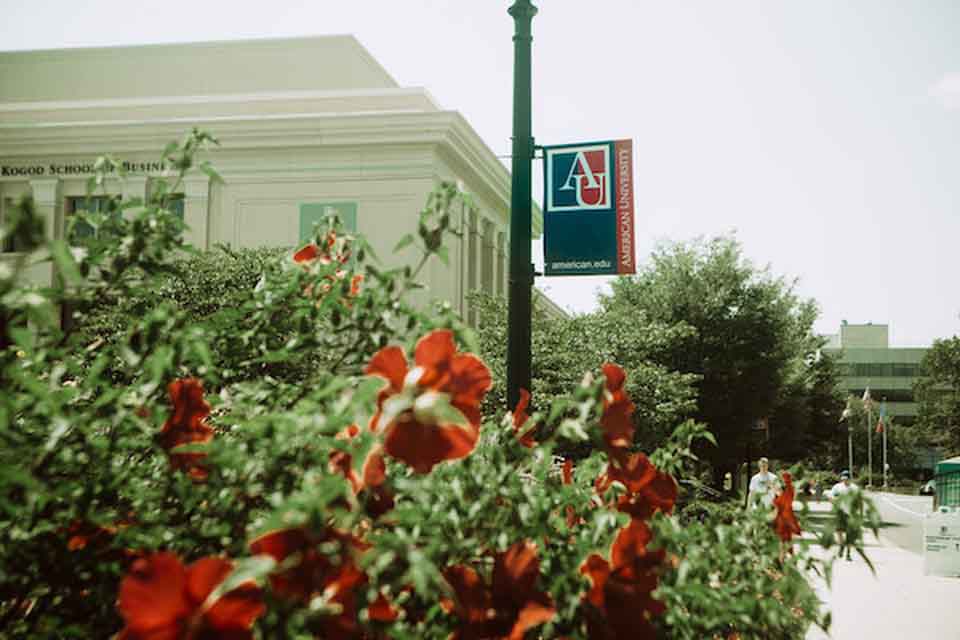Looking back, Kristen Martin can see that the winding path leading to where she is today, earning her master of education in education policy and leadership at American University, began on the day she learned she couldn’t have children and decided to become a foster parent. After the first few days with her new foster son, who is autistic, Martin’s perspective on equal access to high-quality public education in the United States would never be the same. With the support of her professors and her degree from AU, Martin intends to make sure that the American public education system will soon be forever changed because of that day, too.
First came the long nights of research, alone at her computer. Realizing she wasn’t prepared to parent a growing nine-month-old child with special needs, she started reading everything she could about autism. Before long, she quit her job as a loan processor to become a teaching assistant at an elementary school. Seeing that the autistic students were not receiving the support or attention they needed in the classroom, Martin took it upon herself to fall headlong into learning about the most effective methods and interventions to use with autistic children in educational settings. A year after that, she was working as an academic interventionist—a role in which she developed intervention strategies for students with special needs.
As an interventionist, often working with an autistic child in a mainstream classroom, Martin sometimes felt hopeful, because there were plenty of examples of teachers doing their best to adapt to the needs of autistic students while simultaneously managing a full classroom of other children. Unfortunately, Martin also witnessed equally disheartening situations in classrooms: too often, teachers were clearly at the end of their ropes and had come to see students with dramatic learning differences as burdens.
In both cases, Martin realized, all parties involved wanted enriching educational experiences for all of their students and were simply struggling to get there. A glaring lack of resources was what stood in the way, Martin realized.
“In the absence of some type of action,” Martin says, “something being done—support being provided, resources being offered—in the absence of that, things just won’t change, and these teachers will continue to feel like there’s no one in their corner and there’s no way to catch up and come out successful.”
This problem—the very real structural challenges that teachers and autistic students are up against—started to dog Martin. She resolved to find a way to make a greater impact and decided to go back to school. First, she enrolled in an online program to train to become a high school counselor but decided after three terms that she wanted her focus to be on the even bigger picture.
“I wanted to zoom out,” Martin says. “I wanted to have a macro-level impact outside of just one school and effect change for multiple schools—if not every school at some point.”
The next step—deciding to apply to American University’s master’s in education policy and leadership program—came naturally. The program’s focus on and proximity to government would put her right where she wanted to be as she planned the next big steps in her career, and she knew the school’s focus on widening access to high-quality education meant her own passions would be well supported there.
Martin’s passions were so well fostered at AU, in fact, that after just her first semester in the MEd program, she’s already taking steps to build the educational nonprofit she’s been envisioning for years. The breakthrough came in her Strategic Policy course, when her professor asked the students to formulate a goal and write a memo about it. Martin knew right away that she would write about her idea for a nonprofit designed to advocate for and improve educational outcomes for autistic children by visiting and evaluating schools’ programs for these students and providing much-needed resources to fill gaps in services where needed.
“To get that idea down on paper and send it out was like letting go of a child on the first day of elementary school,” Martin says. “You don’t know what’s going to happen, but you’re super hopeful that it’s going to end well.”
The response from her professor was more positive and galvanizing than Martin could have hoped for, she says. He told her that the idea was excellent and that she should pursue it—starting during her time at American. Martin is resolved to do just that.
“It is what you make of it in this program; you can get so much out of it as long as you try,” Martin says. “I have already learned so much because the program forces me to do the legwork myself, rather than relying on someone else to do it for me.”

